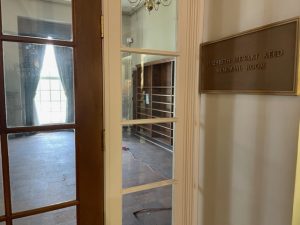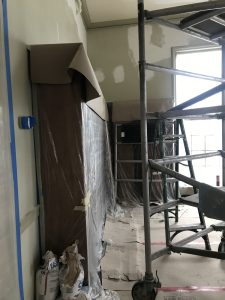WESTFIELD — The Westfield Athenaeum and Amelia Park Children’s Museum were among 90 organizations statewide that recently received SHARP grants from Mass Humanities to support the response and recovery of the cultural sector from the ongoing impacts of the coronavirus.
The Sustaining the Humanities through the American Rescue Plan grants were made possible by the federal American Rescue Plan Act.
Ray Radigan, executive director of the Amelia Park Children’s Museum, said as a nonprofit, grants are a “crucial source” of revenue. The museum received a $7,040 SHARP grant.

The Amelia Park Children’s Museum offers a wide variety of hands-on activities. (SUBMITTED PHOTO BY DANNY NASON /AMELIA PARK CHILDREN’S MUSEUM)
“The pandemic was a stark reminder that we cannot rely too heavily on admission sales and large events,” said Radigan. “Grants, donations, and sponsorships are necessary to maintain and grow the museum.”
Radigan added that during the past two years, grants have become a significant source of the museum’s funding.
“This has allowed us to improve many aspects of the museum without increasing the cost of admission, memberships, or birthday parties,” he said.
Radigan said $5,040 will go toward staffing and $2,000 will go toward upgrading an aging computer system.
“Educational exhibits and events are what we do,” said Radigan. “Qualified staff and quality technology are how we do them.”
Radigan noted that investments have been made on an ongoing basis to improve operations and offer better visitor experiences.
“So, while these may not be immediately visible when you walk in the museum, these upgrades are helping us reach more people digitally, process things like membership renewals faster, and spend more time making museum visits fun, friendly, and educational,” said Radigan.
Guy McLain, executive director at the Westfield Atheneum, shared a similar sentiment on receiving a $10,000 SHARP grant.

The Elizabeth Stewart Reed Memorial Room is receiving a major overhaul, and a recent SHARP grant will assist in paying for the conservation of historical artifacts. (LORI SZEPELAK/THE WESTFIELD NEWS)
“This grant will be used to support our renovation of the Reed Room and the upgrading and reinterpretation of history exhibits,” said McLain.
McLain said two new large cases are being built for the room which will display more than 100 artifacts, some of them “very large.”
“We are also painting the room, installing a new floor, and acquiring new shades in the room that filter out ultraviolet light that can harm historical artifacts,” said McLain, noting he is hopeful the room can reopen by January 2022.

The Elizabeth Stewart Reed Memorial Room is undergoing a total renovation. (SUBMITTED PHOTO/WESTFIELD ATHENAEUM)
McLain added that upgrading the exhibit will include performing needed conservation work on several artifacts before they are installed in the new display. Additionally, new graphic panels will provide context for the artifacts on exhibit.
“Grants like this one from Mass Humanities are absolutely essential in providing the financial support for conservation of historical artifacts, mounting high quality exhibits, and providing programs in the humanities,” said McLain. “The funds provided by the city, although substantial, don’t cover the total cost of operating the Athenaeum. We must rely on private donations and grants to make up the difference.”
SHARP grants are funded through the National Endowment for the Humanities to state affiliates. Mass Humanities decided to use Massachusetts’ allocation to provide emergency funding to the smallest organizations, including local museums, historical societies and historic sites. More than half of the SHARP recipients have budgets of $300,000 or less.
“The SHARP grants are another significant step in the journey to sustain the humanities at the local level,” said Brian Boyles, executive director of Mass Humanities. “As we continue to combat COVID-19, these funds will save jobs, build capacity, and allow organizations to develop new programs to serve their communities.”
Mass Humanities received requests for funding from more than 140 organizations, according to Boyles.
Grants of up to $15,000 were awarded to retain or recruit staff, replace lost revenue, and rebuild audiences. The SHARP grants conclude a year in which Mass Humanities awarded more than $1.7 million to 240 organizations around the state.








